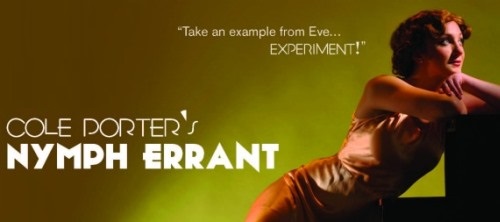
Evangline Edwards has left her finishing school in Switzerland and, encouraged to “experiment” by the school’s chemistry mistress, Miss Pratt, decides to explore the exciting world of sex and lose her virginity before settling down in England. Her “experiments” all fail! Attempted romances include Folies Bergère producer André de Croissant who wants to make her a star; Alexei, a Russian violinist who shows her the soul of Russian music; Count Mantalini of the Holy Roman Empire; Greek businessmen Constantine; and an unfortunate incident where she gets sold into a harem, guarded by Ali. Throughout it all, she is still a virgin. In the harem she meets Haidee, a kidnapped American, and when Ben Winthrop breaks into the harem to rescue Haidee, Evangeline persuades him to rescue her instead, and they run away together to the desert. But he is more interested in plumbing than in love-making. Back in Paris, Evangeline decides to join the Folies after all - enticed by the ten handsome chorus boys in the show. But they are all gay! She gives up and ends up back in Oxford in the vicarage garden with Reverend Pither and friends. As the others go in for tea, Evangeline remain behind. Along comes the new young handsome gardener Joe. They chat awhile, get closer and closer, and finally Joe offers Evangeline an apple. As she takes a bite from the apple, the curtain falls.
Act I
Scene 1 is set in the present (1933) in the garden of Aunt Ermyntrude's house in north Oxford. At rise, Winnie the maid is arranging tea service on a little table, when Edith Sandford, dressed in a Girl Guide uniform, enters through the gate. A spinster of about forty, Miss Sandford is concerned that Aunt Ermyntrude is becoming quite forgetful. Winnie observes that she saw the old woman soaping herself in her bath while fully clothed. Plump Aunt Ermyntrude enters with a watering can and reveals that she has invited to tea the Reverend Malcolm Pither, who runs a questionable hostel for English chorus girls in Paris, and Edith's father, Dr. Sandford, a venerable Oxford don.
At tea, Aunt Ermyntrude explains that her niece Evangeline Edwards is expected to return in one week from her Swiss school, the Pensionnat Bellevue, in Lausanne, of which Ermyntrude herself is an alumna. When Edith learns that Evangeline plans to return alone by train, she is shocked: "I don't approve of women travelling on the Continent. To me immorality begins on the dock at Calais.... I always say to my Girl Guides: 'Learn one language: English. And if you have the misfortune some day to have to travel on the Continent, keep on speaking English, only speak louder.' "
Pither regards this as an expression of "abysmal ignorance," and Edith's own father agrees, much to her annoyance. Pither is determined to find a young, attractive woman who can travel unmolested by train on the Continent and will "bring her here and parade her under your very nose, that her virginal fragrance may dispel the musty, antiquated fumes of your mind." He storms out.
Scene 2 is Evangeline's bedroom at school. We meet her chums: Bertha,a blonde German girl; Joyce Arbuthnot-Palmer, a hearty English girl, very country; Henrietta Bamberg, an American brunette with abroad mid-western accent; and Madeleine, a vivacious French beauty. Finally, we meet Evangeline, in her dressing gown and slippers. She is young, unwise in the ways of the world, and frantic to pack her bags for a train that leaves for Calais in a little more than an hour. The girls all speculate on what the future holds for them. A knock on the door heralds the entrance of their tall and prim English chemistry teacher, Miss Pratt, who promptly offers some scientific advice on life: "Experiment."
Scene 3 is a railway carriage, into which Evangeline scrambles while Miss Pratt hands her some baggage from the platform and reminds her to experiment. The compartment is already occupied by André de Croissant, a handsome, middle-aged Frenchman. Evangeline quietly reads a book, until she realises that she cannot locate her train ticket. She frantically searches for it. The gallant Gallic graciously offers her an extra ticket, which he had purchased for a companion who missed the train. When she tells him that she is returning to Oxford to live with her aunt, André has a better idea. He explains that he owns the famous Folies de Paris and in one season can make her a cabaret star. She admits that she can sing and dance a little and, taking her cue from Miss Pratt, decides to experiment.
The two are joined by Mme. Celestine Arthur, a fashion designer, and her meek, sappy son Hercule. André tells them he is planning to 'visit the seaside resort of Neauvillewith Evangeline, whom he hopes to induce to appear in his Folies. Mme. Arthur says that she and her son are also going there, to display her summer creations. All at once, Hercule begins to exhibit one frock after another. Evangeline giddily agrees to take five dresses and a hat and offers her hand to André, who kisses it. The experiment apparently has begun.
Scene 4 is a colonnade overlooking the beach at "Neauville-sur-Mer." Mme. Arthur and Hercule meet Count Hohenadelborn Mantalini and a morbid Russian, Alexei Stukin. Alexei conducts the hotel orchestra and has fallen in love with Evangeline from afar. They are joined by Clarissa Parks, a cocotte, whose profession is suffering from competition with society women whose morals have sunk to the depth of hers. Evangeline is startled to be reunited with her old friend Madeleine, who, it seems, was supported all through school by a gentleman with whom she has now had a final row. Evangeline tells Madeleine that while en route to Oxford, she met André who wants to star her in his revue and, while waiting for her decision, is treating her as if he were her father. When Evangeline refuses André's offer, she finds herself being wooed by both the Count, who offers to take her to his Venetian palazzo (which is currently being rented to wealthy Americans), and Alexei, who suggests that they either commit suicide together or go to Paris. When Evangeline spies André on a balcony with Madeleine, she at once agrees to pack her bag.
Scene 5. At a cafe in Paris, we learn that Alexei and Evangeline are almost starving, because he cannot get work as a violinist. Determined to find a job for herself, Evangeline goes up to a woman reading a newspaper and discovers that she is another old chum, Joyce, who now lives with a painter named Pierre Fort. When Evangeline explains how hungry they are, Pierre says he will give them money just as soon as his wealthy customer shows up and buys some of his paintings. Just then, the customer appears: it is the Count. At once, Evangeline rises and says, "Venice." The Count reiterates, "Venice." They exit arm in arm, as the others look on in bewilderment.
Scene 6. In the garden of the Palazzo Mantalini in Venice, Manfredo the major domo, Bessie the maid, the chief gondolier, Clara the fat cook, a kitchen maid, and Giuseppe the footman all are exhausted, because their American employers are obsessively social.
The Count has let the house to Mrs. Samuel Lee Bamberg and her daughter Henrietta, yet another schoolmate. The wealthy, social-climbing Mrs. Bamberg is throwing an 1830 costume party and shows the Count her invitation list. It includes Constantine Koumoundouropolos, a Greek businessman whose huge yacht is out in the harbour. Mrs. Bamberg has obviously decided that her daughter will marry a rich European, but the Count is interested in the fact that the Bambergs themselves have money.
When the guests arrive, Henrietta entertains them with a song about the famous writer "Georgia Sand," who shocked her lover by dressing like a man. The Count enters with Evangeline, who is startled to discover Henrietta. They go off to chat, leaving the Count and Constantine. The Count offers to give the Greek his beautiful companion to take away on his yacht, so that he himself can pursue Henrietta. Later, Evangeline is taken aback when Constantine offers to take her to the Orient on his yacht. When Henrietta announces her betrothal to the Count, Evangeline laughs hysterically, wildly sings "Nymph Errant," and shocks the Count by toddling off on Constantine's arm.
Act II
Scene 1, a section of the Acropolis by moonlight. A quartet of tourists bemoans the fact that wherever they travel abroad, they are shown nothing but "Ruins." Constantine has brought Evangeline to Athens to show her the historic city, and they chance to meet an old friend of his, Demetrios Pappas, who runs a home for unfortunate girls who have lost their "sense of proportion." His efficient German secretary turns out to be none other than Bertha; she had travelled to Greece with an archeologist who has since died. Bertha tells Evangeline that Pappas treats her just like a wife, but Evangeline bemoans the fact that all the men in her life "are either idealists or very tired businessmen."
Scene 2. In the small bedroom of Constantine's house in Smyrna, Evangeline paces nervously while waiting for him to return from buying her a dress. Outside, a volley of shots is heard: the Turks are sacking the city. When Constantine knocks on the outside door, his frightened servant Feliza lets him in and then flees for safety. Constantine shows Evangeline the dress that he risked his life to bring her, but she finds it unwearable. Hysterically, he runs to the window, to discover that his warehouse has been set on fire. He rushes outside to protect his property. From the window, Evangeline looks on in horror as he is shot and killed by the Turks. Just then, the door flies open, and in strides the fierce, murderous Kassim Mahmud Ben Hadji, who "bristles with weapons but unfortunately for him is "under five feet tall." When he discovers that Evangeline is British, he offers to take her to the British consulate for two piastras or for a tour of the local statuary. Offended that the slave trader finds her unacceptable for slavery, Evangeline offers to pay him two thousand piastras for a two-day camel ride to the nearby slave market. She leads him out.
Scene 3 is the open court of a harem in a remote province of Turkey. Like the other concubines, Evangeline is dressed in great Oriental splendour, but she is knitting a sock and is very bored. Ali, the resident eunuch, explains that he speaks English perfectly, because he studied at Oxford (and he met his master at Eton). His employer is currently away as the Turkish delegate to the League of Nations in Geneva, but he has promised to return "when universal peace is restored." When the corpulent Ali asks Evangeline if she has ever been in love, she responds that once in school she had measles. Ali then produces a new addition to the harem, a young American Negress named Haidee Robinson, who wanted to see the world and has done so. When Zuleika, one of the concubines, begins to wail in her monotonous chant, Haidee ridicules her by imitating her wail and then launching into a song of her own.
After the song, Evangeline and Haidee exit. No sooner have they gone, than one of the flagstones that pave the court begins to move. The concubines all shriek in horror and race off, as a handsome, young American, Ben Winthrop, pulls himself up from a hole in the ground. Evangeline enters, and Ben explains that the owner of this palace hired him to install a brand new plumbing system. He is quite prepared to rescue her: "I guess we'll have to walk for half a mile through the sewer and there I have a Ford waiting." When Ali suddenly appears, Ben places ten piastras in his hand to buy his silence.
Scene 4. The desert. Evangeline and Ben celebrate the joys of being free. In the fashion of stalwart storybook heroes, Ben professes that he will preserve Evangeline's purity: he will place her the following day on the Paris express at Istanbul, and in three days she will be with friends in the French capital. When she complains of a headache and asks him to rub her temples, he offers her two aspirins. He finally agrees to massage her head, but, when she asks him to sing a "lovely languid sort of serenade," he responds with a heartfelt homage to his one truelove: "Plumbing." Giving upon any hope for romance, Evangeline rises from the ground and suggests they be off.
Scene 5 is a harem set on the stage of the Folies de Paris. André is hysterical, because Madeleine is late as usual for her entrance during a rehearsal. When she finally appears, she and the girls rehearse their routine.
Just then, Reverend Pither and Miss Pratt (of all people) enter with two English girls, who are going to audition as a dance team. Evangeline appears, to André's surprise, and is reunited with Miss Pratt. The chemistry teacher explains that after the school closed, she came to Paris to study at the Sorbonne and one day met Mr. Pither. He asked her to be a matron in his hostel for chorus girls, and then she married him.
Evangeline then informs Miss Pratt of all the trouble her advice has caused: Bertha is in Athens, living in sin, "Joyce took up quarters with a painter," Henrietta married "a dear old white slaver"; only Madeleine has become a star, while she, Evangeline, is "just a girl no man wants." Elated that he has at last found an English girl who can travel the Continent unmolested, Pither agrees to escort Evangeline back to Oxford the very next day. She is undecided, when André invites her to stay and join the show. Miss Pratt begs her to redeem the fate of the other girls and return home.
Scene 6, Evangeline, Miss Pratt and Pither find themselves in front of a curtain at the Folies. Evangeline decides to stay, until André informs her that their relationship will be strictly business, and she will live with the Pithers at their hostel. At once, she agrees to return to Oxford.
Scene 7 is Aunt Ermyntrude's garden in Oxford. As at the opening of the play, Winnie is setting the table for tea; she is chatting with the good-looking young gardener, Joe, whom Aunt Ermyntrude, as confused as ever, continues to call Henry, despite all his corrections. Edith Sandford enters, still wearing her uniform. She reminds her hostess that it is one year to the day since Evangeline was expected back from school.
When Pither escorts the girl into the garden, her aunt's only comment is "You're a little late, dear," to which the dutiful niece responds," Dear Aunty. Yes, you see I stopped on the way from the station to buy you your favourite tea cakes." Pither proudly proclaims to Edith that Evangeline has indeed travelled alone unmolested.
When everyone else exits, Evangeline quietly sings a reprise of "Experiment." On her line, "the apple on the top of the tree," Joe comes to her, offering an apple, as the curtain falls.
Based on the somewhat scandalous novel by James Lavers, this Cole Porter show was expressly created for London and was considered far too saucy for Broadway. It did not get a New York production for almost another 50 years. It was a huge success for Gertrude Lawrence. It was also the first musical with choreography credited to Agnes de Mille.
Cole Porter's biographers invariably list Kiss Me Kate, Anything Goes and Out of This World as his best scores, but Porter himself had one show that he always maintained was his own personal favorite: Nymph Errant. Porter’s choice is hardly known today, but in 1933 it represented the last word in “star vehicle” musical theatre writing. We presented it at Moon in 1998, and are delighted to bring it back as the opening show of our “Going Places” season. If ever a show “went places,” it’s Nymph Errantl
Nymph Errant was originally a wildly successful 1932 novel by James Laver, which chronicled the adventures of a young Englishwoman named Evangeline Edwards, who makes a rather eccentric tour of the world. British producer Charles Cochran was looking for a vehicle for Gertrude Lawrence - flamboyant, outrageous, and one of Broadway and London’s brightest stars. He thought Nymph Errant was a perfect fit.
Cochran quickly enlisted Cole Porter, who was coming off a string of Broadway hits including Gay Divorce, The New Yorkers and Fifty Million Frenchmen. Porter brought along his pal, raconteur/actor/director Romney Brent, to write the book and direct. The writing process proved particularly harmonious, as novelist Laver and librettist Brent joined Porter at his Paris town-house for writing sessions marked in equal measure by hard work, laughter, and champagne breaks.
Following an out-of-town run in Manchester (where the title song was added), Nymph Errant debuted to one of the biggest, most glamorous opening nights London had ever seen. “Experiment,” “How Could We Be Wrong,” and “It’s Bad For Me” were hailed as Porter’s newest hit tunes, but the showstoppers that night were Lawrence’s dazzling laundry-list of body parts, “The Physician” and Elisabeth Welch’s exhilaratingly abandoned delivery of “Solomon.”
Although there were some critical cavils about the extremely frank nature of the book, Gertrude Lawrence and the Porter score were met with acclaim, and the show settled in as London’s latest hit. After a few months, Lawrence’s financial and health problems (she was suffering from exhaustion) led to an early closing for Nymph. Fox Films planned, and then abandoned, a movie version, and a New York transfer never materialized. (Porter immediately followed Nymph with his biggest hit yet, Anything Goes.)
Nothing more was heard from Nymph Errant until a sequence from the show was performed in the 1968 Julie Andrews biography of Lawrence, Star! The American premiere was a workshop presentation by New York’s Equity Library Theatre in 1982. London saw a major concert evening of the songs in 1987 with Lisa Kirk, Alexis Smith, Kaye Ballard, Andrea McArdle, and, amazingly, Elisabeth Welch, singing the song she had introduced 55 years earlier, “Solomon.”
A new, rewritten version of Nymph Errant was performed at the Chichester Festival in England in 1999. It’s unlikely that the show will enjoy a Broadway production anytime in the near future, but the original 1933 version (which we are presenting tonight) still exists to remind us of Laver’s blithely ingenuous heroine and her amatory odyssey, Brent’s cunning wit and - of course - Porter’s supremacy at writing droll, emotional and gloriously melodic songs.
1.Overture (Orchestra)
2. Experiment (Mrs Pratt and chorus)
3. It's Bad for Me (Evangeline)
4. Neauville-sur-Mer (Chorus)
5. The Cocotte (Clarissa)
6. How Could We Be Wrong? (Evangeline and Chorus)
7. They're Always Entertaining (Chorus)
8. Georgia Sand (Henrietta and Chorus)
9. Nymph Errant (Evangeline and company)
10. Ruins (Chorus)
11. The Physician (Evangeline)
12.Solomon (Haidee)
13. Back to Nature with You (Evangeline and Ben)
14. Plumbing (Ben)
15. Si vous aimez les poitrines (Madeleine and chorus)
16. You're Too Far Away (Alexei)
17. Sweet Nudity (Girls and Boys - with soloists)
18. My Louisa (not used)
19. Cazanova (Henrietta)
20. Concert Finale: Experiment (The Company)
Aucun dossier informatif complémentaire concernant Nymph Errant
Aucun dossier informatif complémentaire concernant Nymph Errant
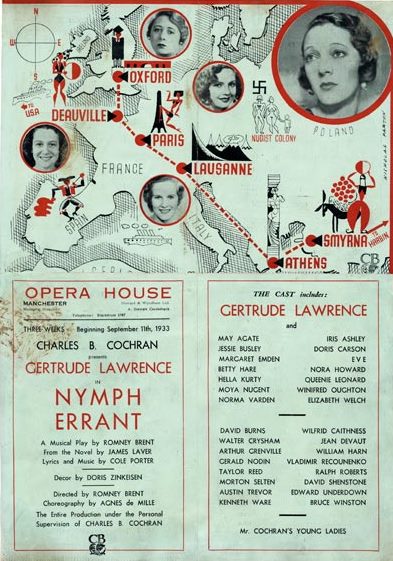
Version 1
Nymph Errant (1933-09-Opera House-Manchester)
Type de série: Pre-London Try OutThéâtre: Opera House (Manchester - Angleterre) Durée : Nombre : Première Preview : Inconnu
Première: 11 September 1933
Dernière: InconnuMise en scène : Romney Brent • Chorégraphie : Agnès de Mille • Producteur : Star(s) : Avec: Evangeline Edwards ... Gertrude Lawrence / Madeleine ... Iris Ashley / Henrietta Bamberg ... Doris Carson / Ben Winthrop ... Walter Crisham / André de Croissant ... Austin Trevor / Constantine ... David Burns / Haidee Robinson ... Elisabeth Welch / Clarissa Parks ... Queenie Leonard / Miss Pratt ... Moya Nugent / Dr. Roberts & Kassim ... Ralph RobertsCommentaires longs: Pre-London try-out avant création à l'Adelphi de Londres le 6 octobre 1933.
Cole Porter’s Nymph Errant opened at the Manchester Opera House in 1933 and the crowds were so huge that special police had to be drafted in to control them. The audience included Noël Coward and Douglas Fairbanks Jnr, with whom Gertrude Lawrence was having an affair at the time. The show, based on a book by James Laver, a curator at the Victoria & Albert Museum, traced the heroine’s travels around the world while trying to lose her virginity. Gertie appeared in four of the shows six long scenes and closed the show exhorting everyone to ‘Experiment’ with life. Perhaps because the episodic nature of the plot made it more of a revue than a musical, reviews of the show were cautious. But no one had any doubts about Lawrence’s performance or that of Elisabeth Welch, who stopped the show with her rendering of Solomon. Their captivating performances can still be heard on recordings made at the time.
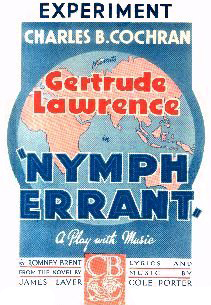
Version 2
Nymph Errant (1933-10-Adelphi Theatre-London)
Type de série: OriginalThéâtre: Adelphi Theatre (Londres - Angleterre) Durée : 4 mois 2 semaines Nombre : 154 représentationsPremière Preview : 06 October 1933
Première: 06 October 1933
Dernière: 17 February 1934Mise en scène : Romney Brent • Chorégraphie : Agnès de Mille • Producteur : Star(s) : Avec: Gertrude Lawrence (Evangeline Edwards), Iris Ashley (Madeleine), Doris Carson (Henrietta Bamberg), Walter Crisham (Ben Winthrop), Austin Trevor (Andre de Croissant), David Burns (Constantine), Elisabeth Welch (Haidee Robinson), Queenie Leonard (Clarissa Parks), Moya Nugent (Miss Pratt), Ralph Roberts (Dr. Sandford, Kassim), Alexander Ivo (Alexei), Morton Selten (Count Hohenadelborn-Mantalini), Edward Underdown (Joe the gardener), Hella Kurty (Bertha), Norah Howard (Joyce Arbuthnot-Palmer), Margaret Emden (Aunt Ermyntrude), Winifred Oughton (Edith Sandford), Wilfred Caithness (Reverend Pither), May Agate (Mme. Arthur), Jean Davaut (Hercule), Jessie Busley (Mrs. Bamberg), Bruce Winston (The Eunuch), Betty Hare, Gerald Nodin, Annabel Gibson, and Kenneth Ware (Tourists)Commentaires : Pre-London try-out: à l'Opera House de Manchester à partir du 11 septembre 1933 prendant trois semaines, produit par C. B. Cochran
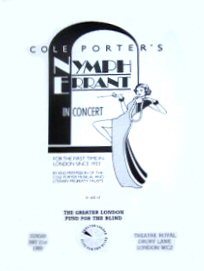
Version 3
Nymph Errant (1989-05-Drury Lane Theatre-London) Concert
Type de série: ConcertThéâtre: Drury Lane Theatre (Londres - Angleterre) Durée : Nombre : 1 représentationsPremière Preview : Inconnu
Première: 21 May 1989
Dernière: 21 May 1989Mise en scène : Aucun • Chorégraphie : Producteur : Star(s) : Avec: Kaye Ballard / Emile Belcourt / Fiona Fullerton / Patricia Hodge / Larry Kert / Lisa Kirk / Andrea McArdle / Maureen McGovern / Virginia McKenna / Liliane MontevecchiCommentaires longs: New Orchestrations by Jim Tyler and Michael Gibson

Version 4
Nymph Errant (1999-08-Chichester Festival Theatre)
Type de série: RevivalThéâtre: Chichester Festival Theatre (Chichester - Angleterre) Durée : Nombre : Première Preview : Inconnu
Première: 05 August 1999
Dernière: InconnuMise en scène : Roger Redfarn • Chorégraphie : Nikki Woollaston • Producteur : Star(s) : Avec: Evangeline Edwards ... Rae Baker / Joyce Arbuthnot-Palmer ... Helen Anker / Henrietta Bamberg ... Alison Carter / Bertha ... Ruby-Marie Hutchinson / Miss Pratt, The Cocotte, Mrs. Bamberg, Aunt Ermyntrude ... Marilyn Cutts / Madeline St. Maure ... Isabelle Georges / All Male Roles ... Mark Adams
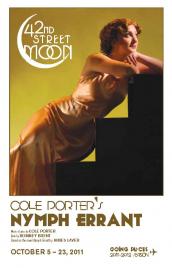
Version 5
Nymph Errant (2011-10-Eureka Theatre-San Francisco)
Type de série: RevivalThéâtre: Eureka Theatre (San Francisco - Etats-Unis) Durée : 2 semaines Nombre : Première Preview : Inconnu
Première: 05 October 2011
Dernière: 23 October 2011Mise en scène : Greg MacKellan • Chorégraphie : Lee Ann Payne • Producteur : Star(s) : Avec: Miss Pratt, Coquette, et al ... Carolin Altman / Bertha, Haidee, et al ... Leanne Borghesi / Hercule, Ali, et al ... Michael Cassidy / Count Mantalini, Kassim, et al ... Saif Eddin / Henrietta, Winnie, et al ... Alexandra Kaprielian / Joyce, et al ... Eliza Leoni / Madeleine, et al ... Lauren Parker / Andre de Croissant, et al ... Ray Renati / Alexei, Rev. Pither, et al ... Steve Rhyne / Evangeline ... Sharon Rietkerk
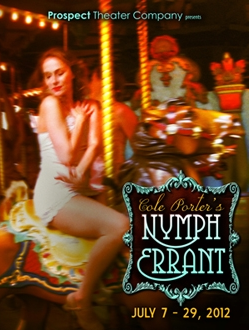
Version 6
Nymph Errant (2012-07-Harold Clurman Theatre-Off Broadway)
Type de série: RevivalThéâtre: Harold Clurman Theatre (Broadway (Off) - Etats-Unis) Durée : 3 semaines Nombre : Première Preview : Inconnu
Première: 07 July 2012
Dernière: 29 July 2012Mise en scène : Will Pomerantz • Chorégraphie : ???? ???? • Producteur : Star(s) : Avec: Miss Pratt ... Cady Huffman / Evangeline Edwards ... Jennifer Blood / Henrietta Bamberg ... Sara Jayne Blackmore / Joyce ... Laura Cook / Bertha ... Amy Jo Jackson / Madeline ... Aubrey Sinn
Pas encore de video disponible pour ce spectacle